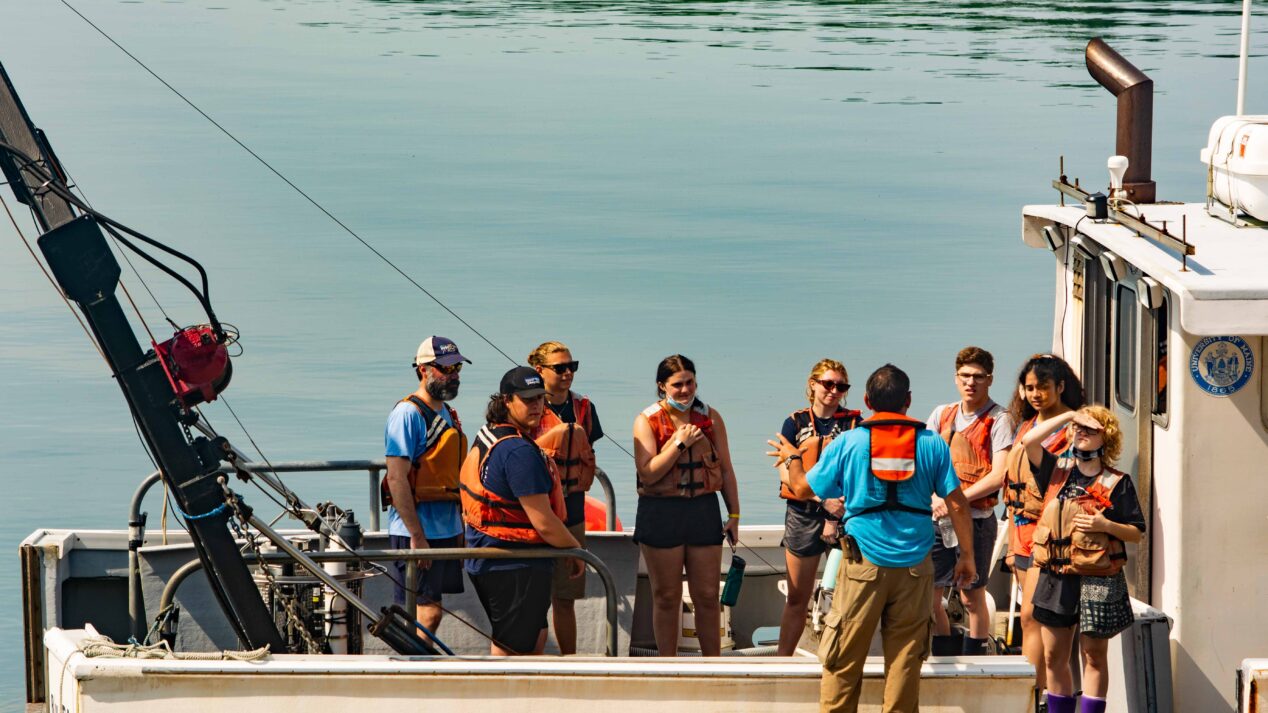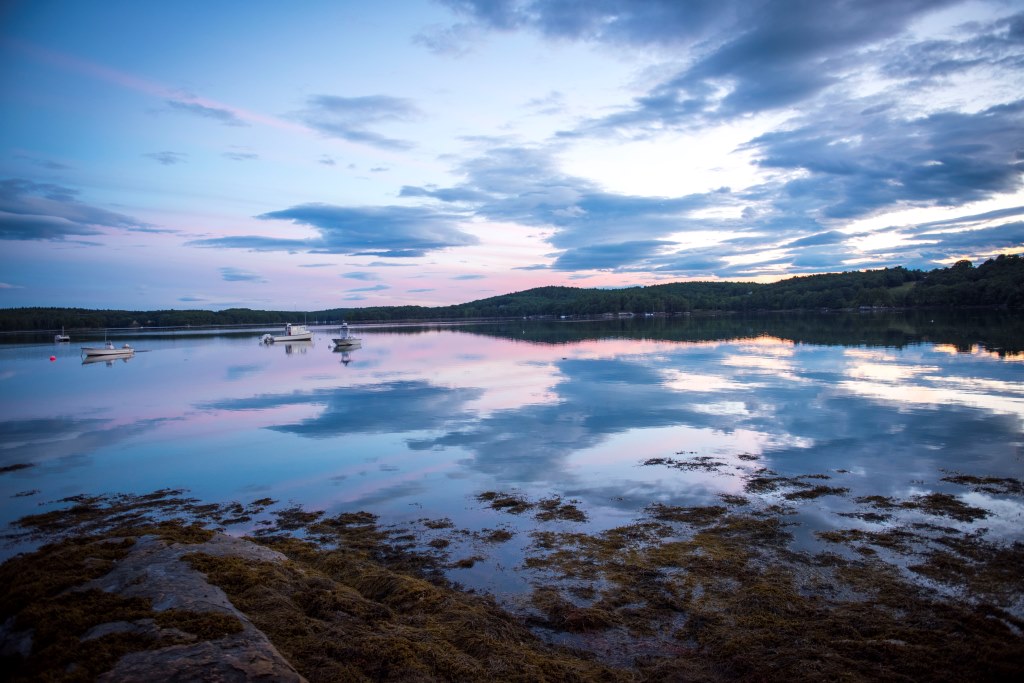2023 Semester By the Sea Course Descriptions
SMS 324: Scientific Diving
Students will be instructed in advanced diving skills, dive rescue, oxygen administration, and research diving techniques. Practical field diving activities will be a large focus of the course. The course will be taught by the UMaine Diving Safety Officer (DSO), selected UMaine faculty, and guest lecturers experienced in using scuba diving as a research tool. Following successful completion of course objectives, students will be eligible to participate in diving research projects as a scientific diver-in-training or scientific diver. Students will also be eligible to apply for applicable recreational diving certifications. Participation is not a guarantee of certification.
If you have a recreational certificate and hope to pursue scientific diving in your academic career, this is the class for you!
Please visit the UMaine Scientific Diving website for detailed information about the program, under the ‘Diver Training’ and ‘SMS324’ tabs. Please read the information on the Scientific Diving course information page carefully, you will not be able to register until you complete the process outlined on that page. Special course fee and requirements apply; see UMaine Scientific Diving website for information.
- Instructor: Christopher Rigaud, UMaine Dive Safety Officer
- Credits: 3
- Limited enrollment
- Schedule: Wednesdays (all day) can be taken during the summer or fall semester

SMS 350: Undergraduate Professional Development Seminar
This seminar provides an opportunity to reflect on your professional goals and passions, and to hone skills related to job seeking, graduate school searches and applications, and professional networking and community engagement. You will have opportunities to practice writing and peer reviewing diverse forms of professional writing, including resumes, brief biographies, letters to professional colleagues and prospective employers, and essays. The course will be offered as a hybrid (with both online and in person instruction) and thus will not meet weekly at a regular time, unlike all other SBS courses. It will include off campus field trips on occasion, both during the week and on the weekend. These field trips will be scheduled to avoid conflicts with the other SBS courses. This course is required for all students enrolled in Semester by the Sea.
- Instructor: Dr. Wge Ellis
- Credits: 1
- Schedule: TBD to avoid conflicts with other SBS courses
SMS 400: Capstone Research
Students are encouraged to participate in independent research as part of the SBS experience. Many students begin their capstone or thesis research in the summer at the DMC through one of the paid internships, and then continue it as part of SBS. Possible capstone advisors include all DMC-based SMS faculty, as well as the professional researchers and other affiliates listed in the DMC Directory. In some cases, students who are advised by community or government partners, or by Orono-based faculty elect to conduct their research during SBS – we do our best to support whatever approach students take. For more details, to ask questions, and/or to confirm that your plans can be supported while you are in residence at the DMC for SBS, please contact the DMC staff.
Instructor: More than 12 faculty and affiliated researchers based at the DMC
Credits: 1-4
Schedule: To be arranged with the research mentor
SMS 479: Microbial Ecology
Microbes – Bacteria, Archaea, viruses and single celled Eukaryotes – are the most diverse group of organisms on Earth. Microbes underlie the ecological function of every ecosystem, and are wonderfully mysterious and exciting to study. This field and lab based course will introduce students to methods used to investigate microbial diversity, and their habitats and activities, while emphasizing concepts. Students will learn to sample the marine environment and begin to characterize and identify microbes in those samples. Students will learn how to measure and interpret the distribution of key chemicals and nutrients in the environment that correspond to microbial activities. Students will become familiar with molecular techniques and how these techniques are used in microbial studies. Overall, students will conduct experiments and analyze and interpret results, with an emphasis on investigative learning and integration with prior knowledge through written reports and presentations.
Instructor: Dr. Jeremy Rich
Credits: 4
Schedule: TBA
SMS 480: Biology of Marine Invertebrates
- Instructor: Dr. Ben Gutzler
- Credits: 3
- Schedule: TBD
SMS 484: Estuarine Oceanography
The course examines the principles of oceanography as seen in estuaries, with emphases on land-sea interactions and human impacts. We address how geomorphology, rivers, tides, and human alterations control the physical and biological properties of estuarine water column and benthic habitats. Fieldwork in mid-coast Maine estuaries includes visits to various habitat types, especially those with human impacts, and hydrographic surveys that use various water, sediment and biota samplers, field sensors, laboratory and modeling approaches. Students will emerge with the environmental context that controls growth of estuarine organisms – both wild and cultured.
Instructor: Dr. Damian Brady
Credits: 4
Schedule TBD
SMS 491: Marine Environmental Change
We are entering an era of accelerated, physical and chemical change in the ocean environment. In this course, students will examine and understand the evidence for these shifts, and explore the observed and predicted consequences for marine systems. Possible topics will include melting ice and increasing temperatures; the spread of low-oxygen conditions and ocean acidification; and the accumulation and cycling of pollutants. Lectures and small-group discussions will center around readings taken from the primary literature, while field trips and laboratory work will introduce students to key observational techniques that are used to document physical and chemical change in the marine environment.
Instructor: Dr. Meg Estapa
Credits: 4
Schedule: TBD
SMS 491: Sensing the Sea
A practical course about design and construction of oceanographic sensors. Students will build electronic sensors to measure ocean properties (focusing on temperature and pressure) and will learn about data collection, quality control, and analysis. The goals are to develop new skills in electronics and sensor design and expertise in how to measure and interpret oceanographic data. These skills and expertise will be valuable for those with a broad range of interests that includes aquaculture, physical, chemical and biological processes, and climate monitoring.
- Instructor: Dr. Greg Gerbi
- Credits: 3
- Schedule: TBD

